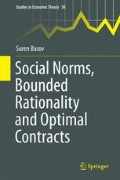Abstract
In this chapter we explicitly model the process of the decision making by economic agents. This gives rise to dynamic models of bounded rationality, where agents adjust their choices with time in a way they consider beneficial.
Access this chapter
Tax calculation will be finalised at checkout
Purchases are for personal use only
Notes
- 1.
See, Basov (2003) for details.
- 2.
Propensity to experiment may have evolved in our ancestors to prevent them from getting stuck in a local optimum. For example, when looking for the optimal fishing spot along a river, they may have found the one that dominates all the nearby locations, but even a better spot may be located a mile away.
- 3.
This intuition is a little misleading since in the equilibrium the principal knows the effort. However, to create correct incentives, she should pretend that she does not know and behave as a statistician who tries to estimate effort from available data.
References
Anderson, S. P., Goeree, J. K., & Holt, C. A. (2004). Noisy directional learning and the logit equilibrium. The Scandinavian Journal of Economics, 106, 581–602.
Arrow, K. J., & Hurwicz, L. (1960). Stability of gradient process in n-person games. Journal of Society of Industrial and Applied Mathematics, 8, 280–294.
Basov, S. (2001). Bounded rationality, reciprocity, and their economic consequnces. PhD Thesis, Graduate School of Arts and Sciences, Boston University, Boston, MA, USA.
Basov, S. (2003). Incentives for boundedly rational agents, 2003. The BE Journal in Theoretical Economics (Topics), 3, 1–14.
Basov, S. (2005). Bounded rationality: Static versus dynamic approach. Economic Theory, 25, 871–885.
Bertrand, M. & Mullainathan, S. (2000). Are CEOs rewarded for luck: A test of performance filtering. NBER Working Paper 7604.
Bush, R., & Mosteller, F. (1955). Stochastic models for learning. New York, NY, USA: Wiley.
Dewartripont, M., Jewitt, I., & Tirole, L. (1999). The economics of career concerns, Part I. Review of Economic Studies, 66, 183–198.
Foster, D., & Young, P. (1990). Stochastic evolutionary game dynamics. Theoretical Population Biology, 38, 219–232.
Friedman, D. (2000). The evolutionary game model of financial markets. Quantitative Finance, 1, 177–185.
Friedman, D., & Yellin, J. (1997). Evolving landscapes for population games. University of California Santa Cruz: Mimeo.
Fudenberg, D., & Harris, C. (1992). Evolutionary dynamics with aggregate shocks. Journal of Economic Theory, 57, 420–441.
Gale, D., & Rosenthal, R. W. (1999). Experimentation, imitation, and stochastic stability. Journal of Economic Theory, 84, 1–40.
Hart, O., & Holmström, B. (1987). The theory of contracts. In T. Bewley (Ed.), Advances in economic theory: Fifth world congress. New York, NY, USA: Cambridge University Press.
Holmström, B. (1979). Moral hazard and observability. Bell Journal of Economics, 10, 74–91.
Holmström, B. (1982). Moral hazard in teams. Bell Journal of Economics, 13, 324–340.
Jensen, M. C., & Murphy, K. J. (1990). Performance pay and top-management incentives. Journal of Political Economy, 98, 225–264.
Kandori, M., Mailath, G., & Rob, R. (1993). Learning, mutation and long run equilibria in games. Econometrica, 61, 29–56.
Mirrlees, J. A. (1974). Notes on welfare economics, information and uncertainty. In M. Balch, D. McFadden, & S. Wu (Eds.), Essays in economic behavior under uncertainty. Amsterdam: North-Holland.
Mirrlees, J. A. (1976). The optimal structure of authority and incentives within an organization. Bell Journal of Economics, 7, 105–131.
Ross, S. (1973). The economic theory of agency: The principal’s problem. American Economic Review, 63, 134–139.
Shavell, S. (1979). Risk sharing and incentives in the principal and agent relationship. Bell Journal of Economics, 10, 55–73.
Spence, M., & Zeckhauser, R. (1971). Insurance, information and individual action. American Economic Review: Papers and Proceedings, 61, 380–387.
Young, P. (1993). The evolution of conventions. Econometrica, 61, 57–84.
Author information
Authors and Affiliations
Corresponding author
Rights and permissions
Copyright information
© 2016 Springer Science+Business Media Singapore
About this chapter
Cite this chapter
Basov, S. (2016). Bounded Rationality, Learning, and Optimal Contracts. In: Social Norms, Bounded Rationality and Optimal Contracts. Studies in Economic Theory, vol 30. Springer, Singapore. https://doi.org/10.1007/978-981-10-1041-5_6
Download citation
DOI: https://doi.org/10.1007/978-981-10-1041-5_6
Published:
Publisher Name: Springer, Singapore
Print ISBN: 978-981-10-1039-2
Online ISBN: 978-981-10-1041-5
eBook Packages: Economics and FinanceEconomics and Finance (R0)

